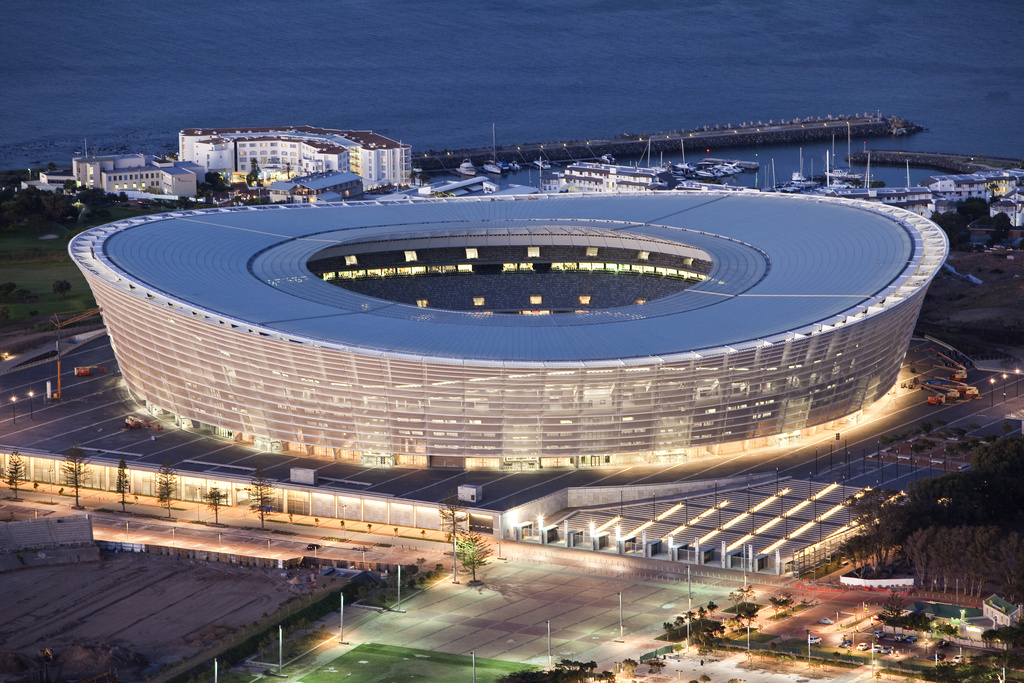
Architect leaves footprint on football stadiums

The woman responsible for managing construction at three of South Africa’s World Cup football stadiums says the three-year project presented a steep learning curve.
Michèle Rüegg, a Swiss architect with Hamburg, Germany-based gmp, spoke to swissinfo.ch about the practical and cultural challenges of building some of the infrastructure for international football’s biggest event.
Rüegg, who studied in Zurich and at Harvard in Cambridge, Massachusetts, calls her start in South Africa a “baptism by fire”.
The company received its first commission for June’s tournament in 2005, when it won a bid to construct the new Nelson Mandela Bay Stadium in Port Elizabeth, a city of 1.3 million in eastern South Africa. A year later it also won the competition to build stadiums in Durban and Cape Town.
The initial phases of preparation had already been completed by the time Rüegg moved to Cape Town in 2006 to lead gmp’s South African office.
Within the span of a little more than two weeks her company had to create fully functional office infrastructure, she said.
“We were able to expedite the planning of projects from Germany and get to know our planning partners in South Africa better,” she told swissinfo.ch. The planning however focused on projects rather than the climate for living and working in South Africa- something Rüegg learned only after she arrived.
Difficult beginnings
Familiar (and simple) tasks back at home like where to get telephones and computers had to be relearned, not to mention understanding local customs.
“All of these things in so short a time in a foreign country, and there was already intense pressure to get familiar with the new environment,” she said.
Also unique, Rüegg says she learned a more direct style of communication. “There are numerous meetings with many stakeholders, with intense discussions and debates. They however are not always very organised,” she said. “You always have to be careful not to lose the details.”
In what she calls South Africa’s “consensus society”, Rüegg said: “Everyone is asked for an opinion and everyone should have a say in finding solutions.” That was sometimes a hindrance, bringing the planning process to a crawl.
“The most important thing was with all the problems that exist in such a large construction site, not losing sight of the final vision for the stadium,” Rüegg said. In Durban it was building an arch more than 100 metres high; in Cape Town and Durban new roofing structures.
But her biggest hurdle turned out to be a little baby. Rüegg says the birth of her son brought her personal life into a collision course with her professional life.
“But these concerns are not really to do with South Africa. Any professional woman who has children is likely to face these challenges,” said the architect.
Safety first
Despite her appreciation for the culture Rüegg quickly became cognisant that for safety reasons she had to keep her guard up. South Africa has one of the highest crime rates in the world. “You move more carefully through the streets than you would in Germany or in Switzerland.”
“I could not travel freely in the city because at certain times it was simply not safe.”
Rüegg also noticed a sporting divide. “The black population loves football very much. In the beginning the whites had no real association with it. They were fixed on rugby and cricket.”
But with the World Cup drawing near “there is a greater enthusiasm felt in all the social groups. That’s why I love football. It brings people together.”
“We will hopefully see the first game in the stadium in Cape Town: France against Uruguay,” she said.
But as the tournament is set to open Rüegg’s work is already in the end stages. She is already working on new stadium projects for the 2014 tournament in Brazil.
Sandra Grizelj, swissinfo.ch (Adapted from German by Justin Häne)
June 16 in Durban against Spain
June 21 in Port Elizabeth against Chile
June 25 in Blowmfontein against Honduras
Michèle Rüegg was born 1970 in Zurich.
She studied architecture at the Federal Institute of Technology in Zurich (ETHZ) and graduated in 1998.
She completed postgraduate degree at Harvard, specializing in architectural history and theory.
From November 2006 to December 2009 she was the site director at gmp’s office in Cape Town.
Rüegg moved with her family to Rio de Janeiro in February 2010.
gmp is responsible for four projects for the 2014 World Cup in Brazil.

In compliance with the JTI standards
More: SWI swissinfo.ch certified by the Journalism Trust Initiative

























You can find an overview of ongoing debates with our journalists here . Please join us!
If you want to start a conversation about a topic raised in this article or want to report factual errors, email us at english@swissinfo.ch.